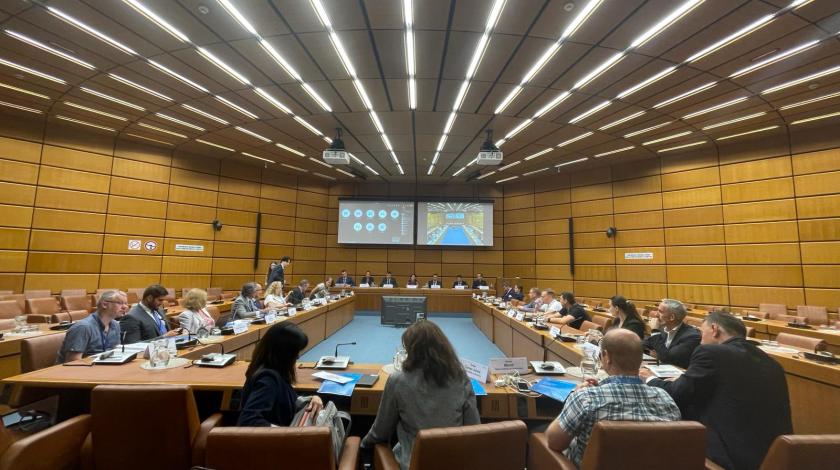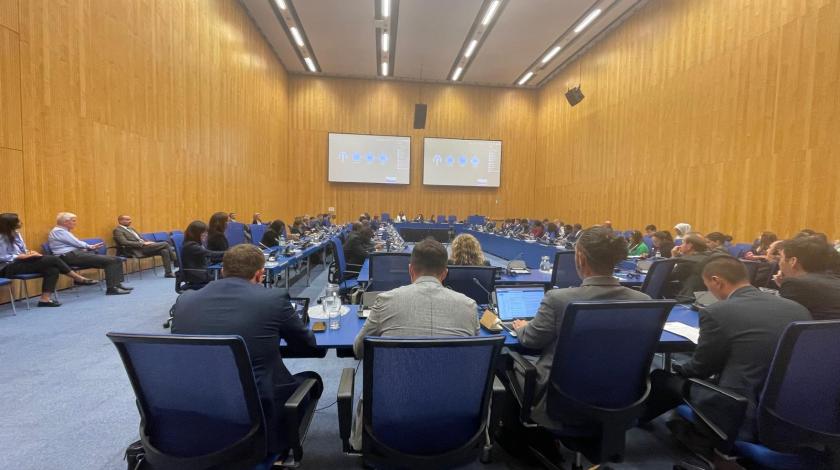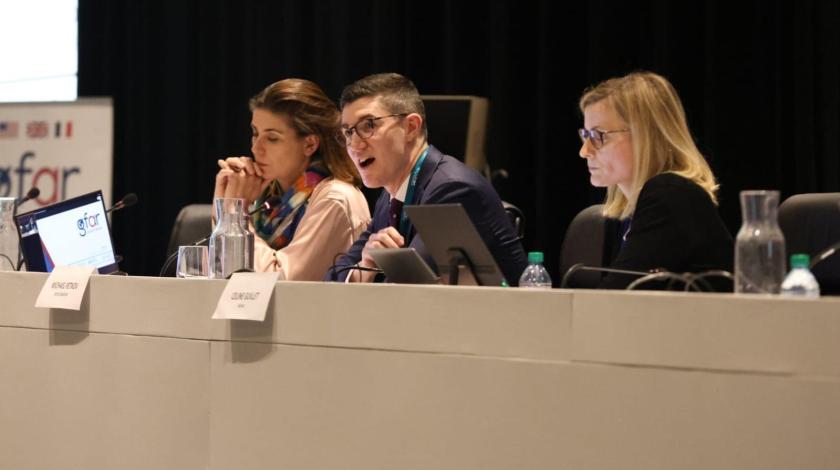In the lead up to the 10th session of the Conference of the States Parties to the UN Convention against Corruption (UNCAC COSP) held in December 2023, the United States, along with France and the United Kingdom launched the GFAR Action Series, which is organized by the Stolen Asset Recovery (StAR) Initiative, in collaboration with the International Anti-Corruption Coordination Centre (IACCC) and the International Centre for Asset Recovery (ICAR).
The first GFAR Action Series meetings were held at the GlobE Network plenary meeting in July 2023 and continued at the UNCAC Working Group on Asset Recovery (ARWG) in September 2023 with practitioner focused discussions in bilateral and multijurisdictional case meetings for the two initial focus countries; Moldova and Zambia. By COSP 10 in December 2023, the number of focus countries had increased to eight, adding Algeria, Honduras, Iraq, Nigeria, Seychelles and Ukraine to the list. Over the course of 2024 and 2025, Bangladesh and South Africa have also joined the GFAR Action Series.
The aim of the current GFAR Action Series is to reinvigorate a practitioner-focused approach geared toward making tangible progress in asset recovery and return by facilitating communication and negotiations among requested and requesting countries in connection with specific ongoing cases which have a transnational component. It promotes the use of the GFAR Principles and highlights stakeholder engagement in asset recovery and return.
The Action Series format is designed to address several challenges in the realm of asset recovery and international cooperation.
- It places a spotlight on the countries of origin, ensuring increased attention and focus on specific nations and cases that often arise from post-conflict or regime change situations requiring rapid response. This targeted approach helps in prioritizing urgent cases that need immediate intervention.
- It fosters political will by bringing both requesting and requested countries to the table, ensuring a commitment from all parties involved in the asset recovery process. This collaborative environment is crucial for overcoming political barriers and ensuring that all stakeholders are aligned in their objectives.
- It addresses the issue of lengthy formal international cooperation processes, which often lack clear timelines. By enabling case consultation meetings that focus on upstream preparation and informal cooperation prior to mutual legal assistance requests, the forum provides a secure setting with clear follow-up actions, thereby streamlining the process and making it more efficient.
- It tackles the lack of capacity by providing technical support to countries seeking the return of stolen assets. This includes preparation and facilitation of case meetings by StAR and its partners IACCC and ICAR, ensuring that the requesting jurisdiction provides necessary information and pursues domestic confiscation orders for foreign enforcement.
- It offers opportunities for peer learning and exchange of experiences, allowing countries to learn from each other's successes and challenges, and a more involved role for requested jurisdictions, thereby enhancing their own asset recovery efforts.
Overall, this forum format is a strategic approach to overcoming the multifaceted challenges in international asset recovery, promoting cooperation, efficiency, and capacity building.
StAR has leveraged eight different events in two years to organize asset recovery case consultation meetings at the GlobE Network Plenary meetings in Vienna and Beijing, the UNCAC Working Group on Asset Recovery (ARWG) and UNCAC Implementation Review Group (IRG) meetings in Vienna and the 10th session of the Conference of the States Parties to the UN Convention against Corruption (UNCAC COSP).
Flexible approach to case consultations
The Action Series promotes a flexible approach by accommodating a larger cohort of focus countries. This means that not all countries will have case consultations at every meeting opportunity. Instead, the timing is tailored to the progress in investigations and asset recovery processes. By piggybacking on other meetings, StAR enables cost-efficiencies for practitioners, ensuring that resources are used effectively. A more detailed analysis of impact and lessons learned of the GFAR Action Series will be developed for the upcoming Conference of the States Parties to UNCAC in December 2025.
Structured preparation for meetings
While flexibility is key, a structured approach is equally important. Case consultations are organized ahead of time to maximize the use of meeting opportunities. Although ad hoc exchanges can occur, both focus countries and requested jurisdictions appreciate knowing what is expected of them before meetings. This preparation allows for efficient use of time and resources, as evidenced by jurisdictions arriving at meetings ready to hand over evidence or responses to mutual legal assistance (MLA) requests due to early engagement.
Practitioner-oriented engagement
The success of the Action Series hinges on having the right people in the room. StAR leverages its mandate, constituency, contacts, and networks to support focus countries in identifying counterparts in the relevant requested jurisdictions and ensuring they meet with them. This practitioner-oriented approach is crucial for effective collaboration and progress.
Comprehensive support from StAR, IACCC, and ICAR
All focus countries receive support from StAR, IACCC, and ICAR through individual and sometimes joint engagements. This support is integral to the Action Series, helping countries prepare for case consultations and implement systems for asset management and returns. Continued technical assistance is essential for maximizing participation and achieving long-term goals.
Leveraging institutional mandates and strengths
The Action Series enables full use of respective institutional mandates and strengths. IACCC provides intelligence and case support, ICAR offers in-country mentoring and case support, and StAR delivers tailored legal and capacity-building support, facilitating engagement with requested jurisdictions. This collaboration ensures comprehensive support without duplicating efforts.
Importance of partnerships
The partnership with IACCC and ICAR is vital, as illustrated by successful cooperation in Moldova, Zambia, and now Bangladesh. These collaborations demonstrate how the international community can adopt a practical, hands-on approach to support countries, moving swiftly while avoiding duplication.
Accountability and momentum through regular check-ins
Preparation and follow-up on case consultations increases accountability on both sides of the asset recovery equation. Organizing regular check-ins between countries helps maintain momentum on cases, ensuring continuous progress and engagement.
Platform approach for targeted outreach
The platform approach has allowed targeted outreach to requested jurisdictions, increasing pressure and making headway with reluctant ones. Smaller jurisdictions or those lacking resources appreciate the structure of the Action Series which enables them to meet with multiple jurisdictions during the same event.
Impact and reporting
The impact of the Action Series is significant, with more detailed reporting available in the StAR 2024 annual report and for the upcoming COSP in December 2025. For instance, in Ukraine, bilateral meetings with three requested jurisdictions led to the formation of a formal Joint Investigative Team and the seizure of real estate and vehicles. This example highlights the tangible outcomes of the Action Series' collaborative efforts.
Building capacity and commitment
As StAR looks to the future, our goal is for focus countries to successfully exit the Action Series after a period of engagement, having significantly built their contacts, networks, and capacity. This journey is not just about immediate gains but about laying a foundation for sustainable progress and self-reliance.
Strengthening political will and commitment
Addressing the challenges faced by focus countries requires renewed political will and commitment. Through the Action Series, StAR aims to foster an environment where such commitment is not only possible but actively pursued. By engaging with key stakeholders and facilitating meaningful dialogue, StAR aims to inspire a lasting dedication to reform and progress.
Enhancing returns and their implementation
A critical aspect of our forward-looking strategy involves more work on the returns of assets and their effective implementation. StAR is committed to ensuring that these returns are transparent and utilized for sustainable development. By doing so, StAR aims to create a positive impact that extends beyond immediate financial recovery, contributing to long-term economic and social growth.
Through these efforts, StAR envisions a future where focus countries emerge stronger, more connected, and better equipped to manage their own development paths. The Action Series is not just a program but a catalyst for enduring change and empowerment.







